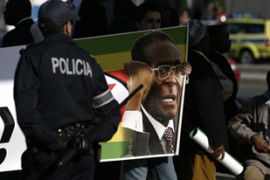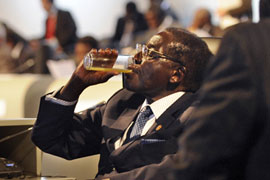Africa leaders reject EU trade deal
New “equal partnership” overshadowed by row over free trade agreements.

Published On 9 Dec 2007
However, The Africa-EU Strategic Partnership signed at the summit pledged to “forge a real partnership characterised by equality and the pursuit of common objectives”.
Economic co-operation
“The partnership should strive to bridge the development divide between Africa and Europe through the strengthening of economic co-operation and the promotion of sustainable development in both continents,” it said.
But, although about one dozen African countries have already agreed interim trade deals with the EU, many continued to argue that they needed more time to prepare their economies and societies for the end of preferential trade arrangements.
Wade said: “I agree with this spirit of creating a new relationship [with Europe], but we have to define what that relationship is.
“It’s clear that Africa rejects the EPAs”.
Anti-poverty campaigners have criticised the deals for failing to provide protection for Africa’s poor farmers and its fragile industry.
Amy Barry, Oxfam trade spokeswoman, said: “Europe must desist from this madness and commit to do all they can to ensure countries are not made poorer by ill-thought out trade deals.
“They must stop pressuring the remaining countries to sign.”
‘Genuine development’
Jose Manuel Durao Barroso, European Commission president, defended the EPAs, saying that they were “indispensable to safeguard trade flows” between Europe and Africa after December 31, when a World Trade Organisation waiver on preferential agreements ends.
“Our objective has always been and remains to conclude economic partnership agreements which aim at strengthening regional integration and bring genuine development to African countries,” he said.
“Obviously this is difficult because it implies change… It is a challenge for both Africans and Europeans and will require time.”
Omar Ben Yedder, published of New African magazine, told Al Jazeera that African countries largely felt that the agreements would be detrimental to the continent.
“Africa, I don’t think, is against free market economies, however, what it also wants is a level playing field,” he said.
“You have certain industries that are key to certain economies in Africa, be it sugar, be it cotton, and these industries would have been affected by the Economic Partnership Agreements.”
An EU spokesman said foreign ministers would meet on Monday to discuss whether to raise tariffs on African nations that rejected the accords.
Dealing with Zimbabwe
Meanwhile, the rancour over European condemnation of the situation in Zimbabwe continued.
 |
| Mugabe described European critics of his human rights record as “arrogant” [AFP] |
The Southern African Development Community criticised Angela Merkel, the German Chancellor, after she accused Robert Mugabe, Zimbabwe’s president, of “harming the image of the new Africa”.
Tomaz Salomao, the bloc’s general secretary, said: “Zimbabwe was not part of the agreed agenda of the summit.
“Our position is that we are dealing with the issue, [South African] President Thabo Mbeki is dealing with the issue … Zimbabwe is our problem, we are dealing with it.”
Mugabe also had his own response for the four “arrogant” European countries that had spoken out against his human rights record, saying democracy came to Africa only in the post-colonial era.
“It is important that people keep in mind that Africans fought for human rights from oppressive rule,” he said in a speech at the summit.
“There was no democracy in Zimbabwe for nearly 100 years and we had to fight for one person, one vote.”
The Zimbabwean leader, who is standing for a sixth term of office in elections next year, has been accused of rigging elections and cracking down on opposition groups.
“Europe will not accept [the results of elections] that are properly held in our countries because they don’t like the winner,” Mugabe said.
Source: News Agencies